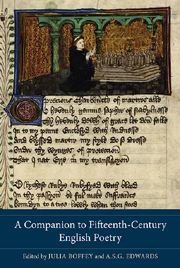Book contents
- Frontmatter
- Contents
- List of Contributors
- List of Abbreviations
- Conventions
- Introduction
- Part I Background and Context
- Part II Authors
- 3 Thomas Hoccleve
- 4 Thomas Hoccleve's Regiment of Princes
- 5 John Lydgate's Major Poems
- 6 John Lydgate's Religious Poetry
- 7 John Lydgate's Shorter Secular Poems
- 8 John Capgrave and Osbern Bokenham: Verse Saints' Lives
- 9 Peter Idley and George Ashby
- 10 John Audelay and James Ryman
- Part III Themes and Genres
- Chronology
- Index of Manuscripts
- General Index
4 - Thomas Hoccleve's Regiment of Princes
from Part II - Authors
Published online by Cambridge University Press: 05 July 2013
- Frontmatter
- Contents
- List of Contributors
- List of Abbreviations
- Conventions
- Introduction
- Part I Background and Context
- Part II Authors
- 3 Thomas Hoccleve
- 4 Thomas Hoccleve's Regiment of Princes
- 5 John Lydgate's Major Poems
- 6 John Lydgate's Religious Poetry
- 7 John Lydgate's Shorter Secular Poems
- 8 John Capgrave and Osbern Bokenham: Verse Saints' Lives
- 9 Peter Idley and George Ashby
- 10 John Audelay and James Ryman
- Part III Themes and Genres
- Chronology
- Index of Manuscripts
- General Index
Summary
To judge by the number of surviving manuscripts, the Regiment of Princes was not only Thomas Hoccleve's most popular poem but also, arguably, among the most popular poems written in Middle English in the fifteenth century. The Regiment survives in forty-six copies that seem to have been designed to be substantial or complete (Edwards 1971; Seymour 1974; Green 1978). In comparison, John Lydgate's Fall of Princes survives in thirty-nine copies that initially seem to have been complete, though selections of it survive in many other manuscripts. The number of surviving Regiment manuscripts also compares favourably with the number of witnesses to the major fourteenth-century Middle English poems: Chaucer's Canterbury Tales survives in fifty-five manuscripts in addition to twenty-eight selected or fragmentary copies; Langland's Piers Plowman survives in fifty-four more or less complete manuscripts plus fragments and extracts; Gower's Confessio Amantis survives in forty-eight complete manuscripts plus fragments and extracts. The Regiment of Princes seems to have been highly regarded by fifteenth-century readers, and it merits the sustained attention that these other significant Middle English poems have been given.
Hoccleve completed the Regiment after March 1410, when John Badby (mentioned in lines 281 ff.) was burned at the stake for heresy, and before March 1413, when Prince Henry, its dedicatee, became Henry V. The poem was most likely written in 1410–11 while the Prince was head of the council and thus effectively responsible for England's governance during Henry IV's illness (for this and further detail of Hoccleve's biography see Burrow 1994).
- Type
- Chapter
- Information
- A Companion to Fifteenth-Century English Poetry , pp. 47 - 58Publisher: Boydell & BrewerPrint publication year: 2013

